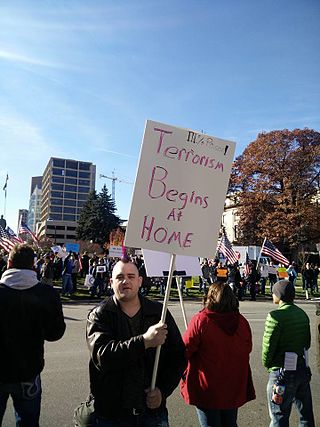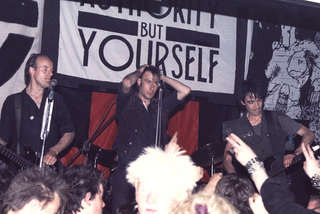Chris Crass (born c. 1973 [1] ) is an American anarchist, activist, and writer on topics of anti-racist and feminist organizing.
In high school, Chris Crass's best friend introduced him to anarchist politics and punk rock. [2] Crass attended San Francisco State University [3] and was an active organizer in the area's Food Not Bombs chapter from 1993 to 2000. [4] In the 2000s and early 2010s, he was an organizer for immigrant rights. [1] [5]
Crass is also a Unitarian Universalist. He lives in Tennessee, with his partner and child. [6]
Anarchism is a political philosophy and movement that is against all forms of authority and seeks to abolish the institutions it claims maintain unnecessary coercion and hierarchy, typically including the state and capitalism. Anarchism advocates for the replacement of the state with stateless societies and voluntary free associations. As a historically left-wing movement, this reading of anarchism is placed on the farthest left of the political spectrum, usually described as the libertarian wing of the socialist movement.
Anarcho-punk is an ideological subgenre of punk rock that promotes anarchism. Some use the term broadly to refer to any punk music with anarchist lyrical content, which may figure in crust punk, hardcore punk, folk punk, and other styles.

The Feeding of the 5000 is the first album by the anarcho-punk band Crass. The album was recorded on 29 October 1978, by John Loder at Southern Studios and was released the same year. It was considered revolutionary in its time due to what was considered an extreme sound, frequently profane lyrical content and the anarchist political ideals in the lyrics. The album also saw the introduction of Crass's policy of ensuring cheap prices for their records. This album is considered one of the first punk albums to expound serious anarchist philosophies.
Anarcha-feminism, also known as anarchist feminism or anarcho-feminism, is a system of analysis which combines the principles and power analysis of anarchist theory with feminism. It closely resembles intersectional feminism. Anarcha-feminism generally posits that patriarchy and traditional gender roles as manifestations of involuntary coercive hierarchy should be replaced by decentralized free association. Anarcha-feminists believe that the struggle against patriarchy is an essential part of class conflict and the anarchist struggle against the state and capitalism. In essence, the philosophy sees anarchist struggle as a necessary component of feminist struggle and vice versa. L. Susan Brown claims that "as anarchism is a political philosophy that opposes all relationships of power, it is inherently feminist".

Anti-Racist Action (ARA), also known as the Anti-Racist Action Network, is a decentralized network of militant far-left political cells in the United States and Canada. The ARA network originated in the late 1980s to engage in direct action and doxxing against rival political organizations on the hard right to dissuade them from further involvement in political activities. Anti-Racist Action described such groups as racist or fascist, or both. Most ARA members have been anarchists, but some have been Trotskyists and Maoists.

Punk ideologies are a group of varied social and political beliefs associated with the punk subculture and punk rock. It is primarily concerned with concepts such as mutual aid, against selling out, hierarchy, white supremacy, authoritarianism, eugenics, class and classism, while supporting anti-consumerism, anti-corporatism, anti-war, anti-imperialism, leftism, anti-globalization, anti-gentrification, anti-racism, anti-sexism, gender equality, anti-homophobia, racial equality, animal rights, free-thought and non-conformity. One of its main tenets is a rejection of mainstream, corporate mass culture and its values. It continues to evolve its ideology as the movement spreads throughout North America from its origins in England and New York and embraces a range of anti-racist and anti-sexist belief systems. Punk does not necessarily lend itself to any particular political ideology as it is primarily anti-establishment although leftist punk is more common due to the prevalence of liberal and conservative ideologies in the status-quo.

Anarchism in Africa refers both to purported anarchic political organisation of some traditional African societies and to modern anarchist movements in Africa.
Anarchism in the United States began in the mid-19th century and started to grow in influence as it entered the American labor movements, growing an anarcho-communist current as well as gaining notoriety for violent propaganda of the deed and campaigning for diverse social reforms in the early 20th century. By around the start of the 20th century, the heyday of individualist anarchism had passed and anarcho-communism and other social anarchist currents emerged as the dominant anarchist tendency.

Black anarchism is a term applied to a group of people of African descent who identify with the principles of anarchism. These people include, but are not limited to, Ashanti Alston, Kuwasi Balagoon, Lorenzo Kom'boa Ervin, Greg Jackson, and Martin Sostre. Critics of the term suggest that it broadly eclipses important political differences between these multi-varied thinkers and incorrectly presents them as having a shared theory or movement. Black anarchism has had a major influence on the anarchist movement, black anarchists have a 100-year history in black-led anti-fascist and anti-racist history.

Crass were an English art collective and punk rock band formed in Epping, Essex in 1977, who promoted anarchism as a political ideology, a way of life, and a resistance movement. Crass popularised the anarcho-punk movement of the punk subculture, advocating direct action, animal rights, feminism, anti-fascism, and environmentalism. The band used and advocated a DIY ethic in its albums, sound collages, leaflets, and films.
Daniel "Deke" Frontino Elash is an American zine editor, musician, actor, activist and historian.
Contemporary anarchism within the history of anarchism is the period of the anarchist movement continuing from the end of World War II and into the present. Since the last third of the 20th century, anarchists have been involved in anti-globalisation, peace, squatter and student protest movements. Anarchists have participated in armed revolutions such as in those that created the Makhnovshchina and Revolutionary Catalonia, and anarchist political organizations such as the International Workers' Association and the Industrial Workers of the World have existed since the 20th century. Within contemporary anarchism, the anti-capitalism of classical anarchism has remained prominent.

Total liberation, also referred to as total liberation ecology or veganarchism, is a political philosophy and movement that combines anarchism with a commitment to animal and earth liberation. Whilst more traditional approaches to anarchism have often focused primarily on opposing the state and capitalism, total liberation is additionally concerned with opposing all additional forms of human oppression as well as the oppression of other animals and ecosystems. Proponents of total liberation typically espouse a holistic and intersectional approach aimed at using direct action to dismantle all forms of domination and hierarchy, common examples of which include the state, capitalism, patriarchy, racism, heterosexism, cissexism, disablism, ageism, speciesism and ecological domination.

Queer anarchism, or anarcha-queer, is an anarchist school of thought that advocates anarchism and social revolution as a means of queer liberation and abolition of hierarchies such as homophobia, lesbophobia, transmisogyny, biphobia, transphobia, aphobia, heteronormativity, patriarchy, and the gender binary. People who campaigned for LGBT rights both outside and inside the anarchist and LGBT movements include John Henry Mackay, Lucía Sánchez Saornil, Adolf Brand and Daniel Guérin. Individualist anarchist Adolf Brand published Der Eigene from 1896 to 1932 in Berlin, the first sustained journal dedicated to gay issues.
Anarchism in Tunisia has its roots in the works of the philosopher Ibn Khaldun, with the modern anarchist movement being first brought to the country in the late 19th century by Italian immigrants. The contemporary anarchist movement arose as a result of the Arab Spring and the aftermath of the Tunisian Revolution.

Anti-fascism is a political movement in opposition to fascist ideologies, groups and individuals. Beginning in European countries in the 1920s, it was at its most significant shortly before and during World War II, where the Axis powers were opposed by many countries forming the Allies of World War II and dozens of resistance movements worldwide. Anti-fascism has been an element of movements across the political spectrum and holding many different political positions such as anarchism, communism, pacifism, republicanism, social democracy, socialism and syndicalism as well as centrist, conservative, liberal and nationalist viewpoints.

Keeanga-Yamahtta Taylor is an American academic, writer, and activist. She is a professor of African American Studies at Northwestern University. She is the author of From #BlackLivesMatter to Black Liberation (2016). For this book, Taylor received the 2016 Cultural Freedom Award for an Especially Notable Book from the Lannan Foundation. She is a co-publisher of Hammer & Hope, an online magazine that began in 2023.
Animal rights are closely associated with two ideologies of the punk subculture: anarcho-punk and straight edge. This association dates back to the 1980s and has been expressed in areas that include song lyrics, benefit concerts for animal rights organisations, and militant actions of activists influenced by punk music. Among the latter, Rod Coronado, Peter Daniel Young and members of SHAC are notable. This issue spread into various punk rock and hardcore subgenres, e.g. crust punk, metalcore and grindcore, eventually becoming a distinctive feature of punk culture.
Anarchism in Syria emerged as a largely disorganized movement during the authoritarian rule of the Assad government, but following the initiation of the Arab Spring has been a particularly notable factor in the Rojava conflict during the civil uprising phase of the Syrian civil war.
Anarchism in Morocco has its roots in the federalism practiced by Amazigh communities in pre-colonial Morocco. During the Spanish Civil War, Moroccan nationalists formed connections with Spanish anarchists in an attempt to ignite a war of national liberation against Spanish colonialism, but this effort was not successful. Despite the brief establishment of an anarchist movement in post-war Morocco, the movement was suppressed by the newly independent government, before finally reemerging in the 21st century.